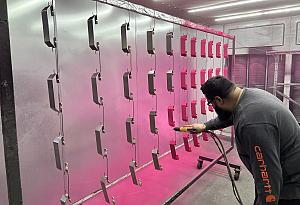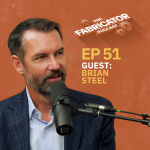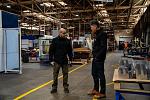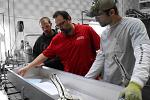- FMA
- The Fabricator
- FABTECH
- Canadian Metalworking
Categories
- Additive Manufacturing
- Aluminum Welding
- Arc Welding
- Assembly and Joining
- Automation and Robotics
- Bending and Forming
- Consumables
- Cutting and Weld Prep
- Electric Vehicles
- En Español
- Finishing
- Hydroforming
- Laser Cutting
- Laser Welding
- Machining
- Manufacturing Software
- Materials Handling
- Metals/Materials
- Oxyfuel Cutting
- Plasma Cutting
- Power Tools
- Punching and Other Holemaking
- Roll Forming
- Safety
- Sawing
- Shearing
- Shop Management
- Testing and Measuring
- Tube and Pipe Fabrication
- Tube and Pipe Production
- Waterjet Cutting
Industry Directory
Webcasts
Podcasts
FAB 40
Advertise
Subscribe
Account Login
Search
Manufacturing jobs available for 'the right candidates'
- By Vicki Bell
- September 16, 2010
But even with the improved image, only 30 percent of survey respondents said they would encourage their children to pursue manufacturing careers. Why such a relatively small number? Fifty-five percent of those surveyed think the long-term outlook for U.S. manufacturing is weaker than today.
"Fabricating Update" related the survey findings and then asked its subscribers: What do you see as the future of manufacturing and production jobs in the U.S., both near- and long-term? Are you aware of any unfilled manufacturing jobs in your area of the country?
The responses were split almost down the middle between those who are optimistic about the future of manufacturing and production jobs and those who are not. Here's what some subscribers had to say:
A subscriber from a company that provides fixtures for retail establishments wrote, “I have been in a metal manufacturing career for 40 years. What I have seen is that benefits like insurance, etc., have become the exception instead of the norm. Average starting pay has decreased and long-term skilled employees' pay has been frozen [or employees are let go] because [they are thought to be] paid too much. Add to that companies automating as much as they can to be competitive in today's marketplace.
"Also with the economy uncertain, companies are looking for everyplace they can save a dollar. The company I work for has a 110-percent employee turnover rate. It is not from lack of workers, but lack of paying enough to keep them. What we have done is go from a small company with highly skilled labor force to a large company with unskilled labor that is semi-automated. Unless a person could start in a company in management, I would not recommend a career in manufacturing until there are changes in benefits and pay. There is just too much uncertainty."
A subscriber who works for a supplier of power tools and shop equipment wrote, "Unfortunately I have several friends who have a manufacturing background and are unemployed. I have lived in this area for 30 years and watched as one manufacturing plant after another closed down. Though I enjoy my career as a manufacturing engineer, I'm afraid I wouldn't encourage any young person to pursue it as a career because the future in manufacturing still doesn't hold much promise."
A subscriber from Texas wrote lengthy responses to both questions:
What do you see as the future of manufacturing in the U.S., both near- and long-term? "Although it has weakened significantly, I believe manufacturing will continue to play a strong role in the near and long future. In my opinion, societal and cultural constraints and influences will somewhat realign as the future evolves. It is important to understand that although many manufacturing jobs have been lost, it is not all due to off-shoring. The statistics continue to show that overall productivity improves every year. Whether by automation or improved efficiencies through the efforts of lean, Six Sigma, and continuous improvement, the U.S. is becoming more and more efficient in manufacturing practices. As seen with our company, we experienced over 20 percent more profit in 2009 (a very down year) with approximately 27 percent less revenue.
"In addition, we did not get rid of a lot of people but simply improved our processes. In the future, technology may play a bigger role in the influence on manufacturing than cheap labor. We're seeing off-shoring backfire some from the quality issues and labor demands by the people in China and India. My only concern overall is governmental control on capitalism. Free market and less government control will not only help manufacturing but all businesses. My hope is to see significant change in the upcoming elections to spur our economy back towards the people of our great nation."
Are you aware of any unfilled manufacturing jobs in your area of the country? "What I continue to hear within the Dallas Metroplex and Texas in general, is the shortage of highly skilled manufacturing individuals. In many "made-to-order" HMLV job shops the labor force is predominantly older and nearing retirement, while fewer younger people are interested in the manufacturing industry. In our area there were a great number of people who gained hands-on-knowledge/ability in combination with education, and that is becoming a rare breed. We have plants in Ohio and California that seem to be facing similar difficulties at times. Unlike Toyota, it is much more difficult to develop a part-time/contract manufacturing group that is skilled enough to come and go with the ever changing workloads. Our efforts have been to strategically cross train full-time employees, while adding temps to help where needed."
A subscriber from the Midwest who asked to remain anonymous wrote: "[We have] several highly skilled positions available in supervision, inspection, machining, and welding for the right candidates. We have limitations on compensation because of the competitive nature of our business. Our capacity has been exhausted, and we have been turning down opportunities until such time as we can overcome our bottlenecks."
There are manufacturing jobs available, for the right candidates. These jobs are not as plentiful as they once were, and likely will not become more plentiful until the aging work force retires, which isn't happening as quickly as we once believed it would. Those fortunate enough to have jobs are holding on to them far longer than they ever thought they would.
Follow fabcomlady on Twitter.
Become a fan of The Fabricator® on Facebook.
subscribe now

The Fabricator is North America's leading magazine for the metal forming and fabricating industry. The magazine delivers the news, technical articles, and case histories that enable fabricators to do their jobs more efficiently. The Fabricator has served the industry since 1970.
start your free subscriptionAbout the Author

Vicki Bell
2135 Point Blvd
Elgin, IL 60123
815-227-8209
- Stay connected from anywhere

Easily access valuable industry resources now with full access to the digital edition of The Fabricator.

Easily access valuable industry resources now with full access to the digital edition of The Welder.

Easily access valuable industry resources now with full access to the digital edition of The Tube and Pipe Journal.
- Podcasting
- Podcast:
- The Fabricator Podcast
- Published:
- 04/09/2024
- Running Time:
- 63:55
In this podcast episode, Brian Steel, CEO of Cadrex Manufacturing, discusses the challenges of acquiring, merging, and integrating...
- Industry Events
16th Annual Safety Conference
- April 30 - May 1, 2024
- Elgin,
Pipe and Tube Conference
- May 21 - 22, 2024
- Omaha, NE
World-Class Roll Forming Workshop
- June 5 - 6, 2024
- Louisville, KY
Advanced Laser Application Workshop
- June 25 - 27, 2024
- Novi, MI































